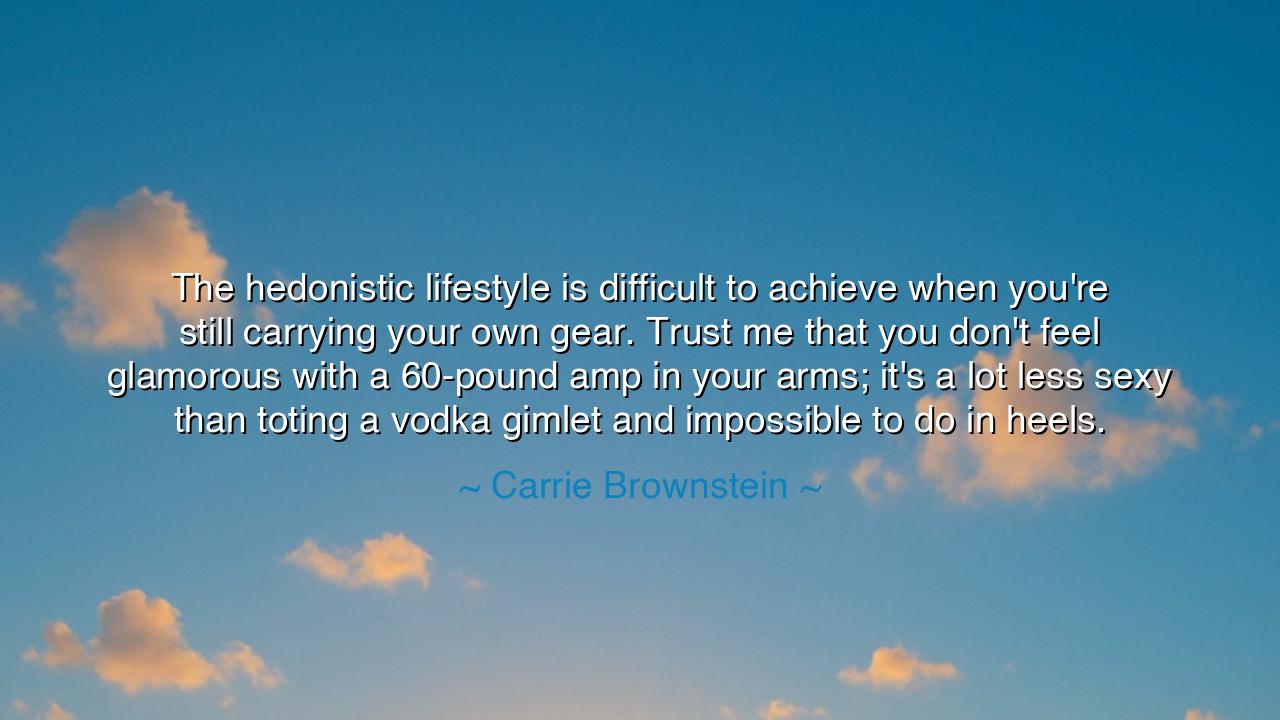
The hedonistic lifestyle is difficult to achieve when you're
The hedonistic lifestyle is difficult to achieve when you're still carrying your own gear. Trust me that you don't feel glamorous with a 60-pound amp in your arms; it's a lot less sexy than toting a vodka gimlet and impossible to do in heels.






The words of Carrie Brownstein are both sharp with wit and heavy with truth: “The hedonistic lifestyle is difficult to achieve when you’re still carrying your own gear. Trust me that you don’t feel glamorous with a 60-pound amp in your arms; it’s a lot less sexy than toting a vodka gimlet and impossible to do in heels.” Though humorous on the surface, her saying reveals a profound wisdom about labor, humility, and the distance between appearance and reality. It is a reminder that behind every image of glamour lies the sweat of unseen effort, and that true artistry demands burdens carried long before the spotlight shines.
The ancients, too, knew this truth well. The heroes of epic song—whether Achilles, Aeneas, or Gilgamesh—were often praised not for moments of glory alone, but for the toil that prepared them for greatness. Achilles’ shining armor dazzled on the battlefield, yet it was the smith Hephaestus who forged it in the sweat of his forge. Likewise, the great musicians and artists of any age do not simply appear in splendor; they first carry their gear, lift their burdens, endure the unglamorous tasks that make the performance possible. Brownstein strips away illusion to reveal the heroic labor behind the art.
Her words are also a rejection of false images of the hedonistic lifestyle. Many imagine the artist as one who floats from stage to party, adorned in excess, basking in endless pleasure. Yet she reminds us: the reality is heavier. The amp must be carried, the cords must be untangled, the stage must be set. There is no glamour in this toil—only the discipline of one who values their craft enough to endure the burden. Thus, she elevates work above indulgence, showing that real artistry is built upon humility, not decadence.
History provides us with examples of this same principle. Consider the life of Michelangelo, whose sculptures seem to breathe divine perfection. Many beheld the finished David in awe, but few saw the endless hours the master spent hunched over stone, covered in dust, his hands blistered and aching. To the crowd, the result was glory; to the artist, the path was toil. Just as Brownstein speaks of dragging a 60-pound amp, Michelangelo’s labor shows that greatness is never achieved by pleasure alone—it is forged in struggle.
Her words carry also a deeper encouragement: do not despise the humble tasks, for they are the foundation of your art. To carry your gear is not shameful—it is part of the journey. The hedonist seeks to skip the labor and taste only the fruit; but the true artist understands that the weight on the back, the calluses on the hands, the sweat before the show—these are all threads in the tapestry of creation. There is dignity in effort, and even if it is not “sexy,” it is sacred.
The lesson is clear: do not be deceived by the false glamour of appearances. Greatness lies not in indulgence, but in perseverance. The spotlight may dazzle the crowd, but it is the heavy lifting beforehand that makes it possible. To honor your craft is to accept the unglamorous as part of the beautiful. And in truth, those who endure the burdens of their path shine brighter than those who merely pretend to live in pleasure.
Practical actions follow: embrace the labor behind your dreams. Do not shrink from carrying the metaphorical amp in your life, whether it is long hours of study, difficult practice, or the unseen sacrifices required for growth. Reject the illusion that success is effortless or glamorous. Instead, take pride in the sweat, the grind, and the persistence. And when the time comes for your moment of glory, you will know that it was not bought by indulgence, but earned through devotion.






TQTran Thai Tu Quyen
Carrie Brownstein’s quote is both funny and insightful. It’s easy to imagine the glamorous side of a hedonistic lifestyle, but the reality is far different, especially when physical labor is involved. How often do we see the unglamorous side of things in real life, whether it’s work or pursuing a passion? Do you think society has an unrealistic expectation of what success should look like, often ignoring the difficult parts?
VVpham van ven
I love how Carrie Brownstein calls out the misconception of the glamorous hedonistic lifestyle. Carrying heavy gear or working hard behind the scenes is far from glamorous, but it’s often the reality for those who pursue their passions. Do you think the focus on superficial glamour in society often distracts us from appreciating the effort and grit behind real success? How do we shift the narrative to acknowledge hard work as part of the 'sexy' side of life?
HBHoang Banaccuytin
This quote really speaks to the difference between the idealized version of a lifestyle and the physical demands that come with it. Carrie Brownstein’s comparison of toting gear with sipping a cocktail in heels makes me wonder, do we romanticize certain lifestyles so much that we forget about the hard work behind them? How can we balance the image of glamour with the reality of the hard work it takes to get there?
BTBao Tran
Carrie Brownstein’s quote highlights the contrast between the glamorous image of a hedonistic lifestyle and the gritty reality of carrying heavy equipment. It makes me think—why do we often romanticize a carefree lifestyle when, in reality, it takes a lot of hard work and sacrifice to live that way? Do you think people sometimes overlook the effort that goes into achieving success and instead focus on the perks and glamour?